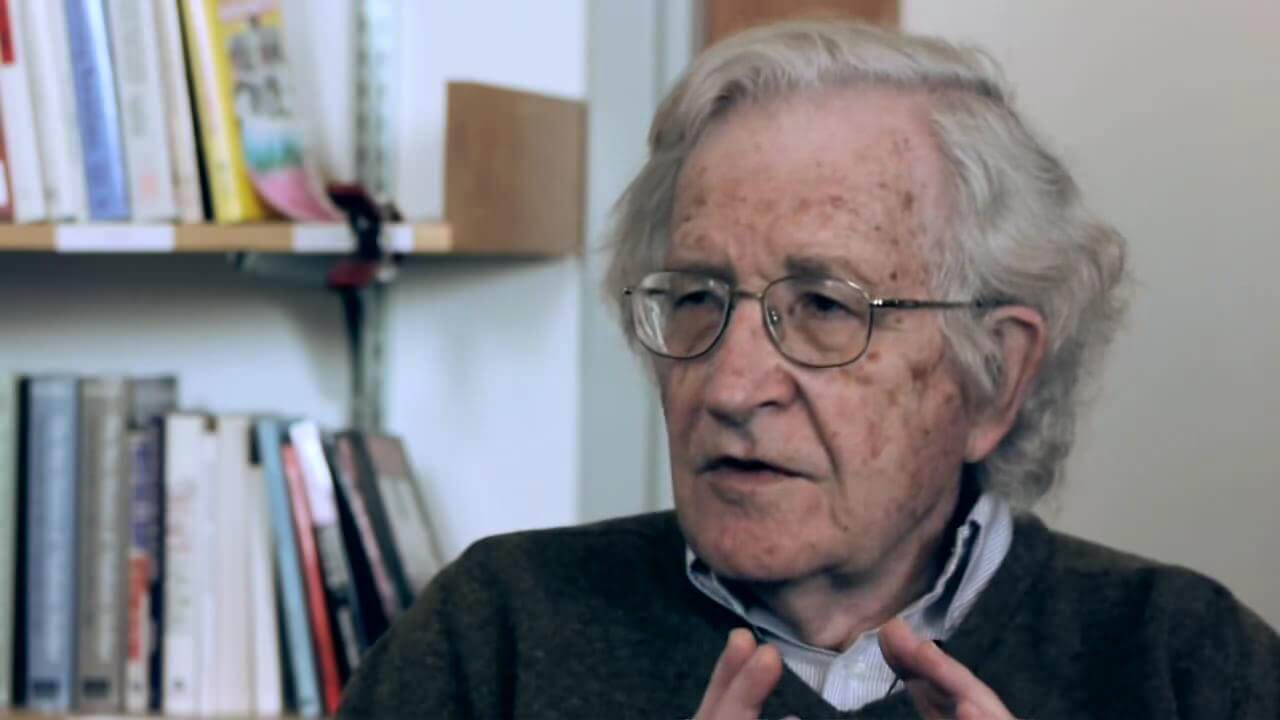
Today The Nation published a piece by Noam Chomsky opposing some aims of the BDS movement (boycott, divestment and sanctions) chiefly on realist grounds, because he says those efforts are and will be ineffective in countering the international consensus on the conflict and US power in maintaining it. The piece is sure to be controversial on the left and get a lot of attention and criticism. What does Chomsky say?
Chomsky refers to the movement as BD:
Meanwhile, a BDS movement (calling for “boycott, divestment and sanctions”) has been formed, often citing South African models; more accurately, the abbreviation should be “BD,” since sanctions, or state actions, are not on the horizon—one of the many significant differences from South Africa.
Chomsky then addresses the three goals of the BDS movement: 1, end the occupation, 2, gain full equality for Palestinian citizens of Israel, and 3, support/promote the right of return of Palestinian refugees. Here is a portion of his critique:
if we’re concerned about the fate of the victims, BD and other tactics have to be carefully thought through and evaluated in terms of their likely consequences. The pursuit of (1) in the above list makes good sense: it has a clear objective and is readily understood by its target audience in the West, which is why the many initiatives guided by (1) have been quite successful—not only in “punishing” Israel, but also in stimulating other forms of opposition to the occupation and US support for it.
However, this is not the case for (3). While there is near-universal international support for (1), there is virtually no meaningful support for (3) beyond the BDS movement itself. Nor is (3) dictated by international law. The text of UN General Assembly Resolution 194 is conditional, and in any event it is a recommendation, without the legal force of the Security Council resolutions that Israel regularly violates. Insistence on (3) is a virtual guarantee of failure.
Though Chomsky seems to suggest that the right of return is a good thing. But he dismisses a one-state outcome as no less implausible than his view that there should be no states at all:
The only slim hope for realizing (3) in more than token numbers is if longer-term developments lead to the erosion of the imperial borders imposed by France and Britain after World War I, which, like similar borders, have no legitimacy. This could lead to a “no-state solution”—the optimal one, in my view, and in the real world no less plausible than the “one-state solution” that is commonly, but mistakenly, discussed as an alternative to the international consensus.
He says that U.S. discrimination is worse than Israeli discrimination, so seeking to grant Palestinians full equality is hypocritical:
The case for (2) is more ambiguous. There are “prohibitions against discrimination” in international law, as HRW observes. But pursuit of (2) at once opens the door to the standard “glass house” reaction: for example, if we boycott Tel Aviv University because Israel violates human rights at home, then why not boycott Harvard because of far greater violations by the United States?
Predictably, initiatives focusing on (2) have been a near-uniform failure, and will continue to be unless educational efforts reach the point of laying much more groundwork in the public understanding for them, as was done in the case of South Africa.
Chomsky rejects the South Africa analogy. Here he cites international opinion of the Israel/Palestine situation, which is more favorable to Israel than it was to South Africa, e.g., Warren Buffett, and suggests that the actual outcome in Palestine is worse than apartheid.
the South African analogy… is a very dubious one. There’s a reason why BDS tactics were used for decades against South Africa while the current campaign against Israel is restricted to BD: in the former case, activism had created such overwhelming international opposition to apartheid that individual states and the UN had imposed sanctions decades before the 1980s, when BD tactics began to be used extensively in the United States. By then, Congress was legislating sanctions and overriding Reagan’s vetoes on the issue.
Years earlier—by 1960—global investors had already abandoned South Africa to such an extent that its financial reserves were halved; although there was some recovery, the handwriting was on the wall. In contrast, US investment is flowing into Israel. When Warren Buffett bought an Israeli tool-making firm for $2 billion last year, he described Israel as the most promising country for investors outside the United States itself.
While there is, finally, a growing domestic opposition in the United States to Israeli crimes, it does not remotely compare with the South African case. The necessary educational work has not been done. Spokespeople for the BDS movement may believe they have attained their “South African moment,” but that is far from accurate. And if tactics are to be effective, they must be based on a realistic assessment of actual circumstances.
Much the same is true of the invocation of apartheid. Within Israel, discrimination against non-Jews is severe; the land laws are just the most extreme example. But it is not South African–style apartheid. In the occupied territories, the situation is far worse than it was in South Africa, where the white nationalists needed the black population: it was the country’s workforce, and as grotesque as the bantustans were, the nationalist government devoted resources to sustaining and seeking international recognition for them. In sharp contrast, Israel wants to rid itself of the Palestinian burden. The road ahead is not toward South Africa, as commonly alleged, but toward something much worse.
The outcome:
The road ahead leads not to South Africa, but rather to an increase in the proportion of Jews in the Greater Israel that is being constructed. This is the realistic alternative to a two-state settlement. There is no reason to expect Israel to accept a Palestinian population it does not want.
Chomsky says John Kerry’s view that apartheid is down the road is a “mirage.” And he says that the U.S. will continue to support Israel no matter what it does, and suggests that the only thing that will end American support is a power struggle with a global rival. (Other realist/left analyses involving the power of the Israel lobby and the growth of anti-Zionism inside the Jewish community are absent from the piece.) He concludes by saying that Cuban forces in Namibia did more to liberate southern Africa from white oppressors than anyone. But Palestinians “can hope for no such savior.” And therefore “should avoid illusion and myth” and devise tactics that answer the particulars of this conflict. It is not clear from the piece what Chomsky thinks those tactics should be.
Update: I’ve twice changed the headline on this post to attempt to more accurately reflect Chomsky’s views.


Typical PEP.
Chomsky does his best to protect Israel and Zionism. Lays blame at the US government for the mess, but fails to mention the Israel Lobby (at all) as part of the systemic problem.
He should have full disclosure (end of article) that he worked on a kibbutz in Israel in the 1960’s.
Chomsky is disappointing. Obviously he can criticize when he decides it is appropriate, but does not want the world to do anything about it.
I have admired his thinking and speaking, but this is totally unlike him.
The palestine israeli dilemna is a world concern. The lack of action on behalf of the palestinians by other countries is an indication of racial biases world wide. Egyptian democracy failed because of israeli american interference and support for racism. This is not about religion.
I have often thought Chomsky is vastly overrated. I’m disappointed but not even that surprised.